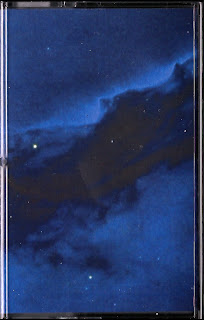Remember Matthew Akers, whose The Elders of New Detroit I’ve reviewed a while back? Well, there’s a
new “carpentercore” player in town, and his name is Spettro Family (real name:
Stefano Iannone). But in addition to wonderfully polished and balanced 80’s-styled
synth vignettes, Spettro adds some of the occultism and outer limits mystery
which appears to be the staple of Brave Mysteries label.
The tape begins with an anthemic display
of power (or maybe the powers of imitation?) “Post Partum”: a dynamic, yet
somewhat nostalgic tune that begins in almost ambient territories, only to
change to a thumping main theme which sets the mood for the rest of the tape.
Spettro Family does not go for the simple carpenterisms though: where one might
expect a cassette full of ultra-manly vintage soundtrack snippets, SF cuts
through a wide variety of moods and styles. “1978 La Fuga” is a good example of
this: it is a quick, even abrupt, transition from the dynamics of the first
track to a melancholic drumless suite based on minimalistic melody reminiscing the childhood years (as the title
might suggest, even though I have a feeling Stefano wasn’t even around in 1978,
but I might be wrong, considering the influx of “old-timers” playing 70’s and
80’s influenced music who actually were alive during that time, such as
Panabrite or Stellar Om Source). Most of the track are short – they’re more
like drafts, variations of basic schemes laid by John Carpenter soundtracks.
Like the relatively calm, yet never
touching the “relaxing” territory “Orrore the Great”, where subtle touches of
sequencer set the pace to a quiet beat.
The flipside is set in a similar “80’s cop
movie” feel, with lush synthesizer drops on throbbing bass lines, but with a
few notable exceptions – like the almost ritualistic “Medjugorje” which
contains samples of Lord’s Prayer recited in an Eastern or Southern European
(Slavic) language – being Polish I can understand most of the words, at first I
actually though it was Polish! This is one of the high points of the cassette –
while most “carpentercore”-rs just try to replicate the action movie vibe,
Spettro Family went into the more mysterious area, with sinister drones in the
background more similar to the work of Burial Hex than Matthew Akers.
Spettro Family covers interesting grounds:
on one side there’s lots of pagan symbolism and (probably) and influence of
neofolk acts of the 1980’s, with Spettro referring to the cassette title being
taken from Celtic and ancient Roman festivals; on the other there’s a fascination
with polished 1980’s synth soundtracks and atmospheric electronics.
Congratulations not only to Spettro Family, who managed to fuse two seemingly
contradicting areas (the outsiderism of ritualists vs. the relative
“mainstream-ness” of John Carpenter movies), but also to the Brave Mysteries
label, who have an extraordinary ear for sonic curios and obscurities, being
both “brave” in their choices and “mysterious” in their sound and roster.
The tape is available at the Brave Mysteries Shop.





